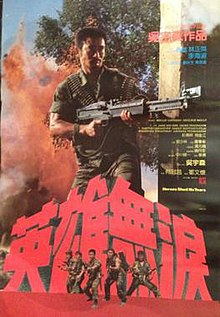Heroes Shed No Tears (1986 film)
| Heroes Shed No Tears | |
|---|---|
 Hong Kong film poster for Heroes Shed No Tears | |
| Directed by | John Woo |
| Screenplay by | John Woo[1] |
| Produced by | Peter Chan[1] |
| Starring |
|
| Cinematography | Naragawa Kenichi[1] |
| Edited by | Yiu-chung Cheung[1] |
| Music by |
|
Production company | |
Release date |
|
Running time | 94 minutes[1] |
| Country | Hong Kong[1] |
| Language | Cantonese[1] |
| Box office | HK$2.8 million |
Heroes Shed No Tears (Chinese: 英雄無淚; Cantonese Yale: Ying Huhng Mouh Leuih; released in the Philippines as Return to Killing Fields) is a 1986 Hong Kong war film directed by John Woo, produced by Peter Chan, and starring Eddy Ko. Filmed prior to the success of Woo's A Better Tomorrow, the film is a story about a group of mercenaries on a mission to extract a drug lord from the Indochina area.
Plot[edit]
The Thai government hires a group of Chinese mercenaries led by Chan Chung to capture a powerful drug lord from the Golden Triangle Area near the Vietnamese border with Laos. The mercenaries manage to capture the drug lord, but his men are trying to set him free. Along the way the heroes cross into Vietnam and must face a sadistic Vietnamese colonel as well as protect the family of Chang Chung which lives in a village near the border.
Cast[edit]
- Eddy Ko as Chan Chung
- Lam Ching-ying as Vietnamese colonel
- Ma Ying-Chun as Kenny
- Philippe Loffredo as Louis
- Cécile Le Bailly as a French girl
- Lee Hoi-Suk as Julie
- Chin Yuet-Sang as Chin
Production[edit]
After finishing Plain Jane to the Rescue director John Woo began working on a film titled The Sunset Warrior.[2] Woo was not happy working for the production company Golden Harvest, noting that he "I just wanted to make any movie for them to finish the contract."[2] Woo found the script to be fairly simple and made changes to it to make it more emotional.[2]
The film was shot in Thailand the film featured cast and crew who did not speak English. This included three Korean actors, two French actors (Phillippe Loffredo and Cécile Le Bailly) and a Japanese cameraman and director of photography.[2][3] The film included scenes of sexuality and drug use which were not shot by Woo.[4]
Release[edit]
After the film's completion, it was shelved. Woo commented that the film was all over the place in tone with sometimes being very emotional, something being as violent as a horror film and that it did not contain any popular actors.[4] As of 2004, Woo stated he had not seen the film in its finished form.[4]
After the popularity of Woo's film A Better Tomorrow, the film was released for one week in Hong Kong under the new title Heroes Shed No Tears.[5] The film was released in Hong Kong on September 5, 1986.[1] It grossed a total of 2.8 million Hong Kong Dollars.[1] In the Philippines, the film was released by Pioneer Releasing as Return to Killing Fields on January 28, 1988, connecting it to the unrelated biographical drama film The Killing Fields despite the latter being set in Cambodia.[6]
Reception[edit]
From retrospective reviews, Heroes Shed No Tears received a four out of ten rating from John Charles in his book The Hong Kong Filmography , 1977-1997.[5] The review noted that the film had "virtually no plot" and "few sympathetic characters" and that it "displays none of the finesse that would characterise Woo's later work"[5] In his book Ten Thousand Bullets, Christopher Heard stated that the film was "nowhere near as slick as [Woo]'s later movies, but it does have a dark visual harshness that indicates Woo knew the direction in which he wanted to travel."[7]
See also[edit]
References[edit]
Footnotes[edit]
- ^ a b c d e f g h i j k "Heroes Shed No Tears". Hong Kong Film Archive. Retrieved 28 July 2016.
Search "英雄無淚" under "Film Title"
- ^ a b c d Elder 2005, p. 43.
- ^ Elder 2005, p. 44.
- ^ a b c Elder 2005, p. 45.
- ^ a b c Charles 2000, p. 448.
- ^ "Opens Thursday". Philippine Daily Inquirer. The Philippine Daily Inquirer, Inc. 24 January 1988. p. 13.
In 1985, Killing Fields – The Movie, shook the entire civilized world. Now we dare you to go back to the land where even angels fear to tread...
- ^ Heard 1999, p. 58.
Sources[edit]
- Charles, John (2000). The Hong Kong Filmography , 1977-1997. McFarland. ISBN 0786408421.
- Heard, Christopher (1999). Ten Thousand Bullets: The Cinematic Journey of John Woo. Doubleday Canada. ISBN 0-385-25731-7.
- Elder, Robert K. (2005). "John Woo:Movie by Movie, 1968 to 1990". In Elder, Robert K. (ed.). John Woo Interviews. University Press of Mississippi. ISBN 9781578067756.
